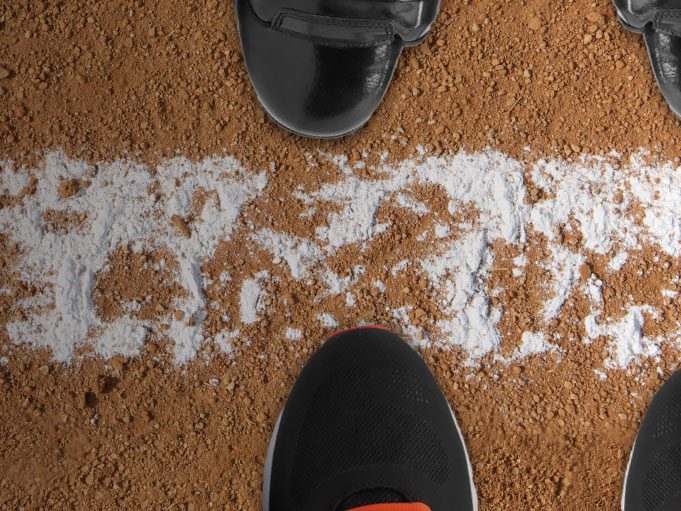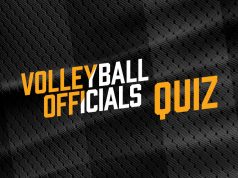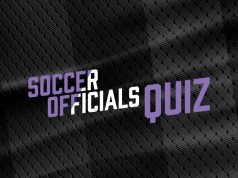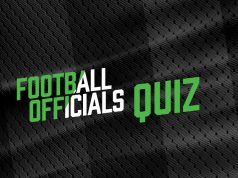By Rick Woelfel
The North Carolina High School Athletic Association (NCHSAA) decided to address the issue head on. The NCHSAA, which serves 408 schools across the state, has implemented a series of mandates designed to promote good sportsmanship as well as facilitate communication between coaches and officials.
Mark Dreibelbis, associate commissioner with the NCHSAA, serves as the organization’s supervisor of officials. With the support of NCHSAA Commissioner Que Tucker, he created the sportsmanship protocols after becoming concerned about the number of experienced officials who were hanging up their striped shirts and whistles.
Dreibelbis, who has been with the NCHSAA 13 years and has officiated three sports (football, basketball and baseball), said he was hearing a common lament. “We are starting to lose officials and the common thread that I’m getting is, ‘It’s not fun anymore,’” Dreibelbis said. “(Officials were saying), ‘I don’t get respect from the coaches, the players, the fans, the administrators.’ That’s not something in my role that I wanted to see happen, because we were losing some of our good field, floor and mat managers, guys that still had years left, but just said, ‘The fun is gone.’”
Dreibelbis also studied the number of ejections, which had increased. During the 2013-14 school year, there were 489 ejections across the state. The following year there were 609, a roughly 20 percent increase. During the 2015-16 academic year, the total hit 678.
Armed with those numbers, Dreibelbis put together a series of protocols, focusing on seven sports: football, basketball, baseball, softball, soccer, wrestling and volleyball. They were presented at a state athletic directors’ meeting and put in place for the 2016-17 academic year.
While the protocols varied somewhat by sport, they all featured two key points:
1. Only the head coach may question a call on the field, court or mat. “We know the head coach is the head of the program,” Dreibelbis said, “and we know that students are going to mirror the actions and activities of the head coach.”
2. The NCHSAA mandates zero tolerance for the use of inappropriate language and profanity by players or coaches. Whether the language is directed at an opponent or an official is immaterial. If a receiver drops a pass in the open field and directs profanity at himself and an official hears it, a flag comes out.
“That language is never appropriate for education-based athletics,” Dreibelbis says, “and we just decided to define that and say, ‘Hey, we’re going to penalize it because it’s not acceptable.’”
The protocol for questioning calls varies somewhat by sport. In baseball and softball, head coaches may come to the foul line in front of their dugout, midway between the plate and first or third base. Once the discussion concludes, the coach must return to the dugout. If the coach exhibits what is considered “unsporting” behavior, his or her team is charged a defensive conference. If his team has used up its allotment of defensive conferences, the coach is ejected.
If a call is changed, the opposing coach may come out to the foul line for an explanation without penalty.
In soccer, the use of profanity results in an immediate yellow card. If the profanity is directed at an official, the penalty is an immediate red card and a two-game suspension. Any unsportsmanlike actions by someone in the team bench area results in a yellow card being issued to the head coach; a second offense results in a red card.
To an outside observer, these measures may seem extreme. But Joe Franks, an assistant director with the North Carolina Coaches Association, said it was apparent that sportsmanship issues needed to be addressed. “We’re all about promoting ethics and sportsmanship,” Franks said. “We were in support of the initiative of trying to reduce ejections, reduce objectionable behavior during contests. Over a period of years, you started seeing an escalation in taunting, in disrespectfully addressing officials, in profanity, in flagrant contact, in fighting and that type of thing. And the folks in North Carolina said, ‘OK, enough is enough.’”
Franks added that his office received no complaints about the mandates.
Now that the standards have been implemented, it’s up to officials to enforce them — officials like Derrick Soellner of Fayetteville, who has worked high school baseball for six years. “(The new standards) have definitely done their job in the aspects of calming the coaches down,” Soellner said. “One of the aspects I did not like was that I thought it added a little bit of time to the ballgame. … What usually takes the most amount of time is when you have to go confer with your partner about anything. If you have that three or four times in a game you can add 20 minutes to a ballgame.”
 Soellner said profanity has not been a problem in the games he’s worked and credits the coaches for emphasizing the issue with players. “I think from the very beginning of the season it was well done,” he said. “We really didn’t have any issues during the season.”
Soellner said profanity has not been a problem in the games he’s worked and credits the coaches for emphasizing the issue with players. “I think from the very beginning of the season it was well done,” he said. “We really didn’t have any issues during the season.”
Dreibelbis made it clear he wanted the standards enforced. Officials who fail to do so will be suspended.
Not surprisingly ejections spiked during the most recent school year, to 780 through May
1. There were a total of 81 coaches ejected, the majority in baseball (22) and, as the NCHSAA calls it, men’s basketball (20).
“We hope in the second year (the 2017-18 academic year) that those would level off,” Dreibelbis said. “(In years past) maybe we hadn’t penalized (unsportsmanlike behavior) as much. Now we are actively doing that.
“I’m very pleased with how our officials have addressed this. When I’ve talked to them, I’ve told them, ‘We’ve empowered you take care of things. We’ve empowered you to be able to be great game managers as well as protect your own safety and welfare. Now, if you don’t do this, shame on you because you’re missing the opportunity.”
Franks, who is a non-voting member of the NCHSAA board of directors, is pleased with how the state association is stepping up to address the issue. “I do think it’s going in the right direction,” he said. “I do think this is going to be a positive without a doubt. You’ve got to try and set good examples and reinforce positive behavior; I think that’s the most important thing we can do.”
Dreibelbis said the mandates are still being fine-tuned. In baseball, for instance, if a coach questions a call made on the bases, the base umpire will be part of the conference at the foul line as opposed to just the crew chief. In football, if an assistant coach raises an objection, officials might respond, “Coach, all communication must be through the head coach,” rather than immediately reaching for their flag.
At issue is whether officials will continue to enforce sportsmanship standards the way the NCHSAA wants them to. “I would say overall, as the games have gotten more meaningful, I’ve already seen a little bit more leniency in what we’ve done from early in the season,” Soellner said, “and only because I think some of our officials are hesitant to toss a coach or a player when it’s a first-round playoff game or a conference championship.
“But what I will say is overall, being harsh early in the season helped us get to this point. This is not a huge issue right now but I think moving forward, if this is something our state doesn’t continue to push every year, that (the sportsmanship standards) could go away or (enforcement) could get lax.”
Rick Woelfel, Willow Grove, Pa., works various levels of softball and in the past has officiated baseball, basketball and football. £
What's Your Call? Leave a Comment:
Note: This article is archival in nature. Rules, interpretations, mechanics, philosophies and other information may or may not be correct for the current year.
This article is the copyright of ©Referee Enterprises, Inc., and may not be republished in whole or in part online, in print or in any capacity without expressed written permission from Referee. The article is made available for educational use by individuals.

















